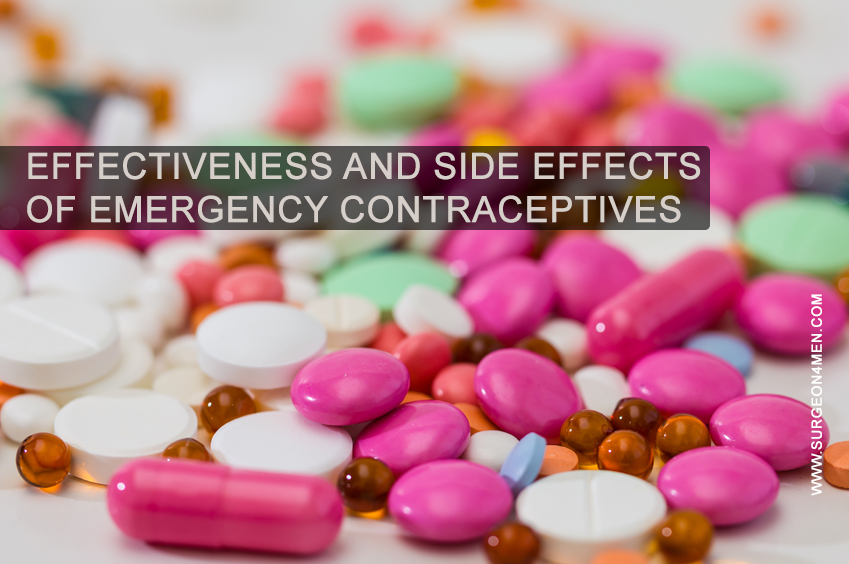Effectiveness And Side Effects Of Emergency Contraceptives
Are you aware that 45% of all the pregnancies in the United States are unintended? This corresponds to more than 3 million of 6.2 million pregnancies that happen any given year in the US. Various strategies and awareness programs are in play to reduce the number of unintended pregnancies in order to improve the overall health of mother as well as the baby. In this regard, emergency contraception really plays a great role by providing protection to women who are not on a regular (or more reliable) contraceptive agent such as IUD.
How Effective Are Emergency Contraceptives At Preventing Pregnancy?
The effectiveness of emergency contraceptives varies from drug to drug and greatly depends on how quickly you took it after an unprotected sexual encounter. For example, if progestin only pills are taken within 24 hours of unprotected sex, the risk of possible pregnancy can be reduced by up to 95%. However, if the same pill is taken between 48 to 72 hours of unprotected sex, the risk of pregnancy can only be reduced by up to 61%.
Ella is the only drug that provide 5 days’ effectiveness. However, some researchers believe that Plan B One Step yields protection for up to 120 hours.
Are There Any Side Effects Associated With Emergency Contraceptives?
Emergency contraceptives are generally not advised to couples who are in steady sexual relationships by healthcare professionals. The reason is primarily because the failure rate is very high as most people tend to forget the pill after successful sexual encounter. Other than that, most emergency contraceptive pills are generally safe.
The most common side effect is nausea but, taking smaller meals more frequently after using emergency contraceptives can reduce the risk of nausea and vomiting. Ella causes less nausea as compared to progestin only pill. According to a new study, less than 10% women reported nausea after consuming Ella. Other possible side effects are:
- Headache
- Fatigue
- Dizziness
- Tenderness in breasts
- Abdominal pain
In most cases, these side effects usually subside after a few days.
In some women, these pills can alter menstrual cycle due to which many women observe spotting after taking them. Plan B one step can slow down ovulation and increase the risk of pregnancy in following days therefore, it is important to use effective methods of contraception throughout the ovarian cycle. It also alters the date of new menstrual cycle and blood flow. In case next periods are a week or more late, there is possibility of pregnancy therefore, it is necessary to consult gynecologist at earliest convenience.
Availability
Both next choice and plan B one step are available as OTC drug for women aging 17 or above whereas for girls below 17, prescription is generally needed. Availability of plan B one step has been controversial due to several reasons. Initially it was marketed under brand name Plan B and two pills were required to be taken. FDA had approved it as a prescription drug for women of all age groups. But later an application was submitted to make it an OTC drug which was first rejected but then it was made available as over the counter drug for women aged 17 and over. In year 2009, the single pill version was approved.
Other Choices
Another not so common option is intra uterine device which can prevent pregnancy more effectively if inserted within 7 days of unprotected intercourse. In addition, people who are in steady sexual relationships are generally better off using IUDs for long term contraception (up to 5 years). These devices are inserted by doctors and serve as a long-term birth control method. They are much more effective than emergency contraceptives.
References
- Von Hertzen, H., Piaggio, G., Peregoudov, A., Ding, J., Chen, J., Song, S., … & Wu, S. (2002). Low dose mifepristone and two regimens of levonorgestrel for emergency contraception: a WHO multicentre randomised trial. The Lancet, 360(9348), 1803-1810.
- Trussell, J., Raymond, E. G., & Cleland, K. (2014). Emergency contraception: a last chance to prevent unintended pregnancy. Contemp. Readings L. & Soc. Just., 6, 7.
- Yen, S., Parmar, D. D., Lin, E. L., & Ammerman, S. (2015). Emergency contraception pill awareness and knowledge in uninsured adolescents: high rates of misconceptions concerning indications for use, side effects, and access. Journal of pediatric and adolescent gynecology, 28(5), 337-342.
